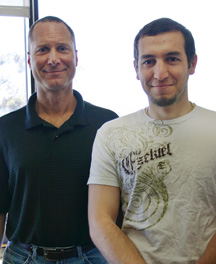

Researchers Discover Genetic Clues about Formation of Cancer Tumors
By Steve Carpowich and Mika Ono
A new research study provides previously unknown genetic clues into how cancerous tumors form in the human breast, brain, and colorectal system.
The findings by researchers at the Scripps Translational Science Institute (STSI), a collaboration between The Scripps Research Institute and Scripps Health, appeared in an advance, online issue of the journal Genome Research on July 2, 2009.
In the new study, research scientist Ali Torkamani and Professor Nicholas Schork analyzed genetic data from 44 breast cancer, colorectal cancer, and glioblastoma tumors and identified specific mutations (changes in a cell's DNA) within groups of genes that are strongly involved in tumor formation.
While a large number of mutations occur within any tumor, not all of them contribute directly to the tumor's growth. Some mutations are akin to "random noise" while other mutations cause a growth advantage for tumors. The new study differentiated between the random and causative mutations.
"Understanding which specific mutations cause a tumor to form is an important step that may potentially translate into a more personalized approach to treating cancer patients," said Torkamani. "These mutations provide us with targets for drug development that presumably would be more efficient at killing cancer, with lower toxicity levels that are safer for patients."
The new study builds upon earlier research conducted by Johns Hopkins University scientists, who sequenced cancerous tumors and studied individual genes linked to tumor growth. Because tumors form in many different ways, the scientists designed their research to look at groups of genes.
The Schork laboratory focuses on the development and implementation of analysis methods for understanding the genetic determinants of complex human traits and diseases such as cancer, neuropsychiatric disease, and cardiovascular disease. These methods focus on the design, integration, and interpretation of studies making use of contemporary high throughput genomic technologies.
The research was supported by the National Institutes of Health, Scripps Genomic Medicine, a Scripps Translational Sciences Institute Clinical Translational Science Award, and a fellowship to Torkamani from The Donald C. and Elizabeth M. Dickinson Foundation.
For more information on the research, see Genome Research at http://genome.cshlp.org/content/early/2009/07/02/gr.092833.109.abstract.
Send comments to: mikaono[at]scripps.edu

"Understanding which specific mutations cause a tumor to form is an important step that may potentially translate into a more personalized approach to treating cancer patients," says research scientist Ali Torkamani (right), shown here with co-author Professor Nicolas Schork. Photo by Kevin Fung.
